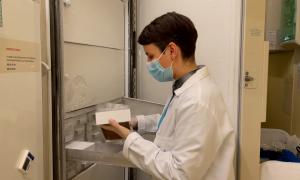Some antigen tests are 10 times less sensitive against certain SARS-CoV-2 variants, but effective with omicron

IrsiCaixa has studied the ability of four different brands of antigen test to detect SARS-CoV-2 alpha, beta, delta and omicron variants | The results demonstrate the importance of monitoring the sensitivity of tests to variants as they emerge
Rapid antigen tests, designed to detect the original SARS-CoV-2 variant, have been an essential tool during the COVID-19 pandemic. With the appearance of new variants, the team at IrsiCaixa has seen the need to study whether these compromise the sensitivity of the tests. The results, published in the Frontiers in Microbiology journal, show that, under favourable conditions, one of the four tests studied loses sensitivity against the alpha variant. Under extreme conditions, however, all the tests become 10 times less sensitive to the alpha variant and two of them to delta. For omicron and beta, the detection capability of the tests studied is not altered under any conditions. The study, with the participation of NESAPOR EUROPA and the Microbiology Service of the Germans Trias Hospital, highlights the importance of validating the sensitivity of the antigen tests as new variants of SARS-CoV-2 emerge.ç
Antigen tests work thanks to antibodies that, when they detect a SARS-CoV-2 protein called nucleocapsid, mark a red band that accompanies the control band, confirming, with this second mark, the infection. The nucleocapsid is found inside SARS-CoV-2 and in order to detect it, the virus must be broken down. It is for this reason that the instructions involve mixing the swab we put in our nose with a liquid, which is responsible for breaking up the virus and releasing the nucleocapsid so that it is exposed to the test. During the study, the ability of four different brands of antigen test –Roche, Nesapor, Siemens and Abbott– to detect the alpha, beta, delta and omicron variants, which have been considered of concern at different times during the COVID-19 pandemic, was evaluated. "These variants contain mutations in the nucleocapsid, so we studied them in the lab. To do this, we used viruses isolated from patients", says Dàlia Raïch-Regué, first author of the study together with Jordana Muñoz-Basagoiti, both researchers at IrsiCaixa.
Alpha is the worst detected variant and Omicron and Beta are the best detected
The results of the study show that, under favourable conditions where the tests contain enough liquid to break up the viruses well and therefore expose the nucleocapsid, all variants can be detected by all four tests studied except for alpha, which is not detected in one of the tests. When an antigen test is performed, there are several variables that can cause the nucleocapsid not to be easily detected, such as too much mucus in the sample. "We have tested what the results would be under these extreme conditions and we have seen that all the tests are 10 times less sensitive to the alpha variant", says Muñoz-Basagoiti. Moreover, under these conditions, the delta variant is detected worse in two of the four tests studied. These results contrast with those of the omicron and beta variants, which are still correctly detected by all tests, both in favourable and extreme conditions. Omicron is one of the last variants of concern and therefore these results are positive as they indicate that its detection is not compromised by the antigen tests.
It is important to monitor the sensitivity of the tests to the new variants
Although antigen tests work well and their use remains paramount for pandemic control, this study shows that their effectiveness can be affected by the emergence of new variants and, for this reason, monitoring is key. However, in order to do so, it is necessary to know exactly which regions of the nucleocapsid each antigen test detects and to monitor the mutations that new variants incorporate in order to predict whether they affect the regions detected by the test. "When antigen tests were first developed, knowing the exact region of the virus that the tests recognise was not essential. What was important was that they were reliable in diagnosing positive and negative cases. However, with the emergence of new variants, this reliability can be compromised, so efforts must be made to identify these regions. This is the only way we will be able to monitor them quickly and effectively", says Nuria Izquierdo-Useros, researcher at IrsiCaixa.
The usefulness of rapid tests lies in their ability to detect infected individuals as soon as they become infectious in order to isolate them and stop the chain of transmission. "Despite the relaxation of anti-COVID-19 measures, it is important to continue this monitoring. If we do not do so, we risk not knowing that the sensitivity of the tests to the new variants is very low, as is the case with alpha, and that we cannot correctly detect infected people in the initial stages," concludes Julià Blanco, IGTP researcher at IrsiCaixa. The researcher points out that, to prevent this from happening, it is necessary to carry out a control and, in addition, to design tests specifically aimed at the most constant and least mutated parts of the nucleocapsid.